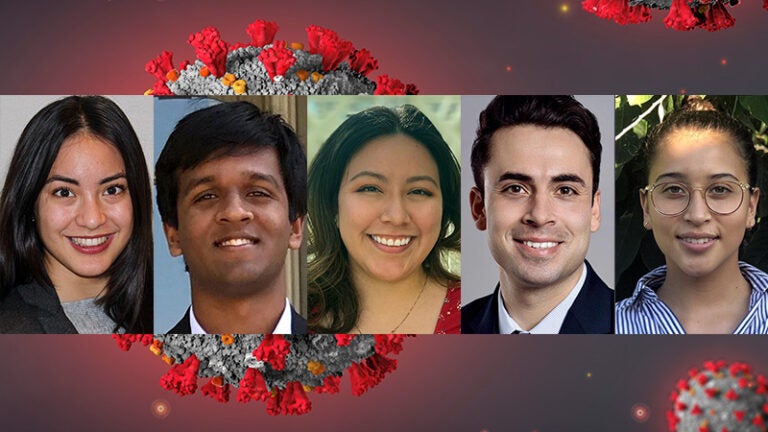
Meet the students who fight COVID-19 through research
As vaccine rollouts continue across the country, it’s easy to forget that the progress made in fighting the COVID-19 pandemic would never have been possible without front-line medical professionals, scientists, researchers — and students.
From the the Spanish major who saw the need for bilingualism in medicine to the advocate who wants to expand health care coverage in Los Angeles, a special group of USC students has been at the forefront of COVID-19 antibody research.
Hear firsthand from some of the USC Dornsife College of Letters, Arts and Sciences students who — under the direction of Neeraj Sood, director of the COVID Initiative at the USC Schaeffer Center for Health Policy & Economics — have been part of the teams working with the city of L.A., the L.A. Fire Department and surrounding communities to better understand and battle COVID-19.
Rachel Gutkin
Junior
Major: Spanish (health care studies minor, pre-med track)
Hometown: Irvine, California
As a Spanish major, Rachel Gutkin saw the importance of bilingualism in medicine, especially in L.A. Starting as a volunteer, Gutkin said what initially attracted her to the study was not only the actual COVID-19 research but also the opportunity to use her Spanish fluency to assist underserved communities.
One of the more difficult parts of her work was navigating the variations of Spanish that people spoke. Gutkin learned Spanish in school, which can be different from how many people speak it day to day. She quickly had to adjust to speaking more conversationally while also trying to convey medical terminology and dispel any COVID-19 misinformation.
“I can imagine how things get so lost in translation from English to Spanish, and then someone’s telling them something else,” she said. “The amount of people that it goes through by the time it reaches that person — that piece of information is so twisted and convoluted that it’s not at all like the original message was.”
Nikhilesh Kumar
Junior
Major: Neuroscience (comparative literature minor)
Hometown: Sacramento, California
As president of the student organization Southern California Health Care Outreach, a health care advocacy organization that works to expand health care coverage in L.A., Nikhilesh Kumar said he was inspired to volunteer after hearing Sood speak in April.
Kumar said volunteering provided him the hands-on research experience he had hoped for and also allowed him to interact with students from various fields. Having primarily worked on formatting and creating surveys, he was happy to contribute to research that has both local and national impact.
“It’s so cool to see something that I worked on be important and relevant in policymaking because I’m interested in politics and policy and how policies affect people,” he said. “Something that I worked on would be directly influencing policies soon, so that’s really cool to see.”
Samantha Lozano
Senior
Major: Human Biology (health care studies, forensics and criminality minor)
Hometown: San Gabriel, California
Samantha Lozano admits that, as excited as she was to volunteer for the project, her family did not share her enthusiasm.
“They were like, ‘Really? You want to go out and test a bunch of families for COVID when we’re trying to stay safe right now?’” Lozano said. “But this is what I want to do in the future, so I thought it was a risk worth taking.”
Also bilingual, Lozano said she’d eventually like to work in an emergency room, specifically in pediatrics. She already has volunteer experience with Children’s Hospital Los Angeles and is the president of Mobile Clinic USC, a student group that works with Keck School of Medicine of USC and the John Wesley Community Health Institute to provide high-quality primary care to residents at various homeless shelters throughout L.A.
Omar Toubat
Ph.D. student in Philosophy and M.D. student (Development, Stem Cells and Regenerative Medicine)
Hometown: Walnut, California
As an L.A. native who earned his bachelor’s degree at USC, Omar Toubat saw this as an opportunity to be part of significant research on both a national and local level. Initially serving as a site lead on the antibody test, Toubat said the actual research made up only a portion of his duties.
Early in the study, he and his team of researchers received a lot of questions about COVID-19 from the community, and he quickly learned the value of effective communication.
“Providing clarity, or an understanding of what is factual or what is evidence-based, was a big part of what we did,” he said. “I felt like, in addition to conducting the study, there was a lot of conversation with study participants and even among volunteers to make sure that we were all on the same page. It was pretty humbling to be involved in because the residents of Los Angeles County wanted to participate and help further our understanding of COVID.”
Sonia Treminio
Senior
Major: Health and the Human Sciences (economics minor)
Hometown: Lynwood, California
A first-generation college student, Sonia Treminio started as a translator in multiple studies and said the experience showed her the true impact COVID-19 had on Latino communities across L.A.
One of the most difficult elements was often correcting misinformation. Treminio said she noticed a language and education barrier caused a lot of distrust within the community, which made her think about how different their experience would’ve been had she or other researchers not spoken Spanish. Ultimately, the experience allowed her to connect with and provide comfort to people in her own community.
“The San Fernando Valley is predominantly Latino,” she said, “so getting to know my community more, speaking to them in Spanish and being able to help them has been such a rewarding experience.”